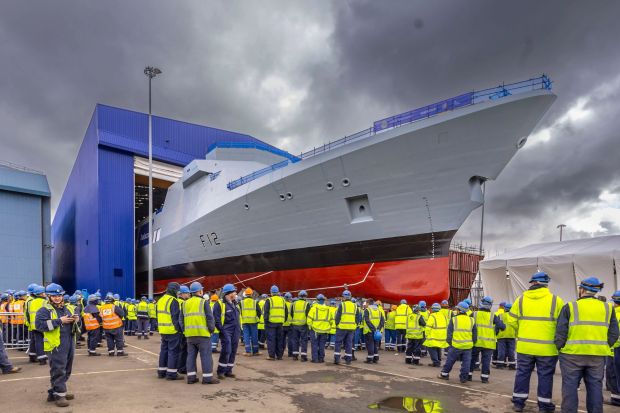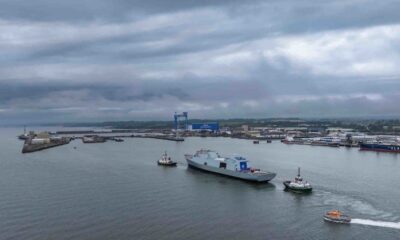Business
Scotland to Build Warships for Denmark and Sweden After £10bn Deal

Scotland is set to embark on a significant defence project, preparing to build warships for Denmark and Sweden shortly after securing a substantial £10 billion order from Norway. The UK Government is in advanced discussions with these Nordic nations to produce the Type-31 Arrowhead 140 frigates, which are designed to enhance naval capabilities.
The state-of-the-art vessels are expected to be constructed at the Babcock shipyard located in Rosyth, Fife. Meanwhile, the five Type-26 frigates, aimed at submarine hunting, will be built at BAE Systems in Govan, Glasgow. This development underscores Scotland’s growing role in international shipbuilding and defence manufacturing.
Positive Outlook for Scottish Shipbuilding
A source within the Labour government praised the recent activities, stating, “Following the £10 billion deal with Norway, Labour is making good on its promise to sell Scottish shipbuilding to the world. That’s the defence dividend in action that the SNP want to give up.” The Labour Party views these contracts as vital for job security and economic growth in Scotland.
If negotiations proceed as expected, an agreement with Denmark could be announced within a month, potentially leading to the construction of three Type-31 frigates. Furthermore, a deal with Sweden is anticipated by the end of this year, which may involve four additional ships.
Prime Minister Sir Keir Starmer expressed concern about the lack of enthusiasm from First Minister John Swinney regarding the Norway order, which is expected to secure approximately 2,000 jobs for Scots over the next decade. During Prime Minister’s Questions, Starmer remarked, “I am perplexed that the First Minister has not welcomed this. This is a massive deal for Scotland — it’s 15 years of shipbuilding.”
In response, Swinney did acknowledge the announcement, albeit briefly, referring to it as a “welcome investment in the future of Clyde shipbuilding.” The contrasting reactions highlight differing perspectives on the significance of these contracts for Scotland’s economic landscape.
Industry Reactions and Future Prospects
A spokesperson for Babcock confirmed the ongoing negotiations, stating, “We are working on a potential opportunity for the design and build of frigates for Denmark. But it’s still very much an active competition which is very important to us and which we are striving to win, so wouldn’t be appropriate to comment further.” This statement reflects the competitive nature of the shipbuilding industry, where securing contracts is crucial for sustaining operations and employment.
The UK Ministry of Defence echoed this sentiment, stating, “We remain committed to supporting Babcock in negotiations for the export of the Arrowhead 140 design.” This commitment suggests a strategic focus on enhancing the UK’s position in international defence contracts.
As Scotland looks to solidify its role within the global shipbuilding sector, these developments signify not only potential economic benefits but also an opportunity to strengthen ties with NATO allies in Northern Europe. The coming months will likely reveal how these discussions unfold and the impact they will have on the Scottish economy and the defence industry as a whole.
-

 Entertainment3 months ago
Entertainment3 months agoAnn Ming Reflects on ITV’s ‘I Fought the Law’ Drama
-

 Entertainment4 months ago
Entertainment4 months agoKate Garraway Sells £2 Million Home Amid Financial Struggles
-

 Health3 months ago
Health3 months agoKatie Price Faces New Health Concerns After Cancer Symptoms Resurface
-

 Entertainment3 months ago
Entertainment3 months agoCoronation Street’s Carl Webster Faces Trouble with New Affairs
-

 Entertainment3 months ago
Entertainment3 months agoWhere is Tinder Swindler Simon Leviev? Latest Updates Revealed
-

 Entertainment4 months ago
Entertainment4 months agoMarkiplier Addresses AI Controversy During Livestream Response
-

 World2 weeks ago
World2 weeks agoBailey Announces Heartbreaking Split from Rebecca After Reunion
-

 Science1 month ago
Science1 month agoBrian Cox Addresses Claims of Alien Probe in 3I/ATLAS Discovery
-

 Health4 months ago
Health4 months agoCarol Vorderman Reflects on Health Scare and Family Support
-

 Entertainment2 weeks ago
Entertainment2 weeks agoCoronation Street Fans React as Todd Faces Heartbreaking Choice
-

 Entertainment4 months ago
Entertainment4 months agoKim Cattrall Posts Cryptic Message After HBO’s Sequel Cancellation
-

 Entertainment3 months ago
Entertainment3 months agoOlivia Attwood Opens Up About Fallout with Former Best Friend





















